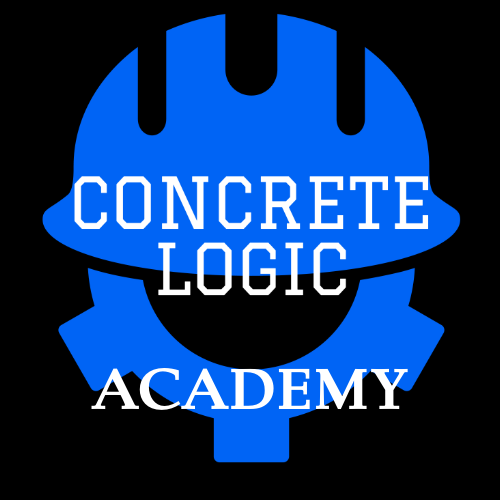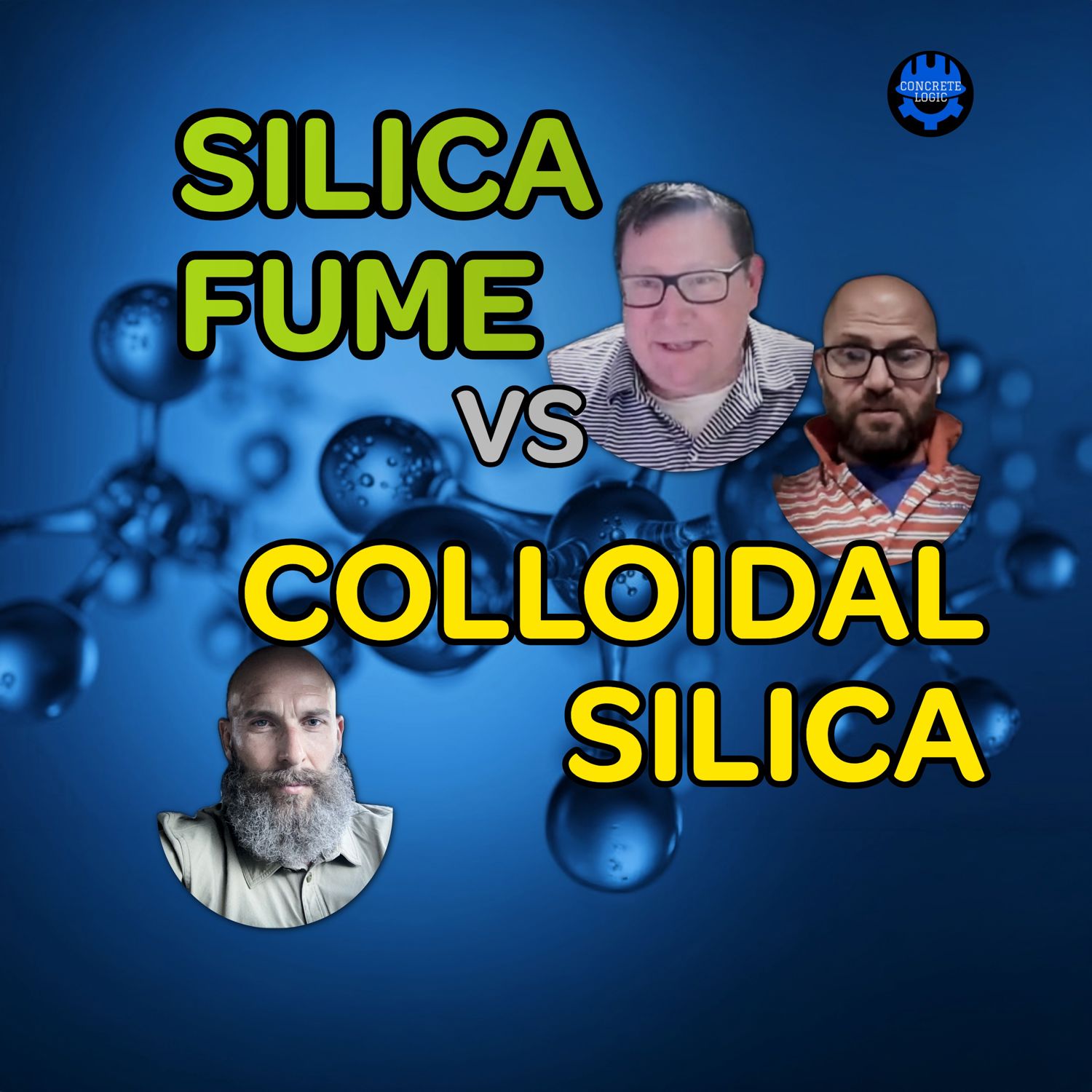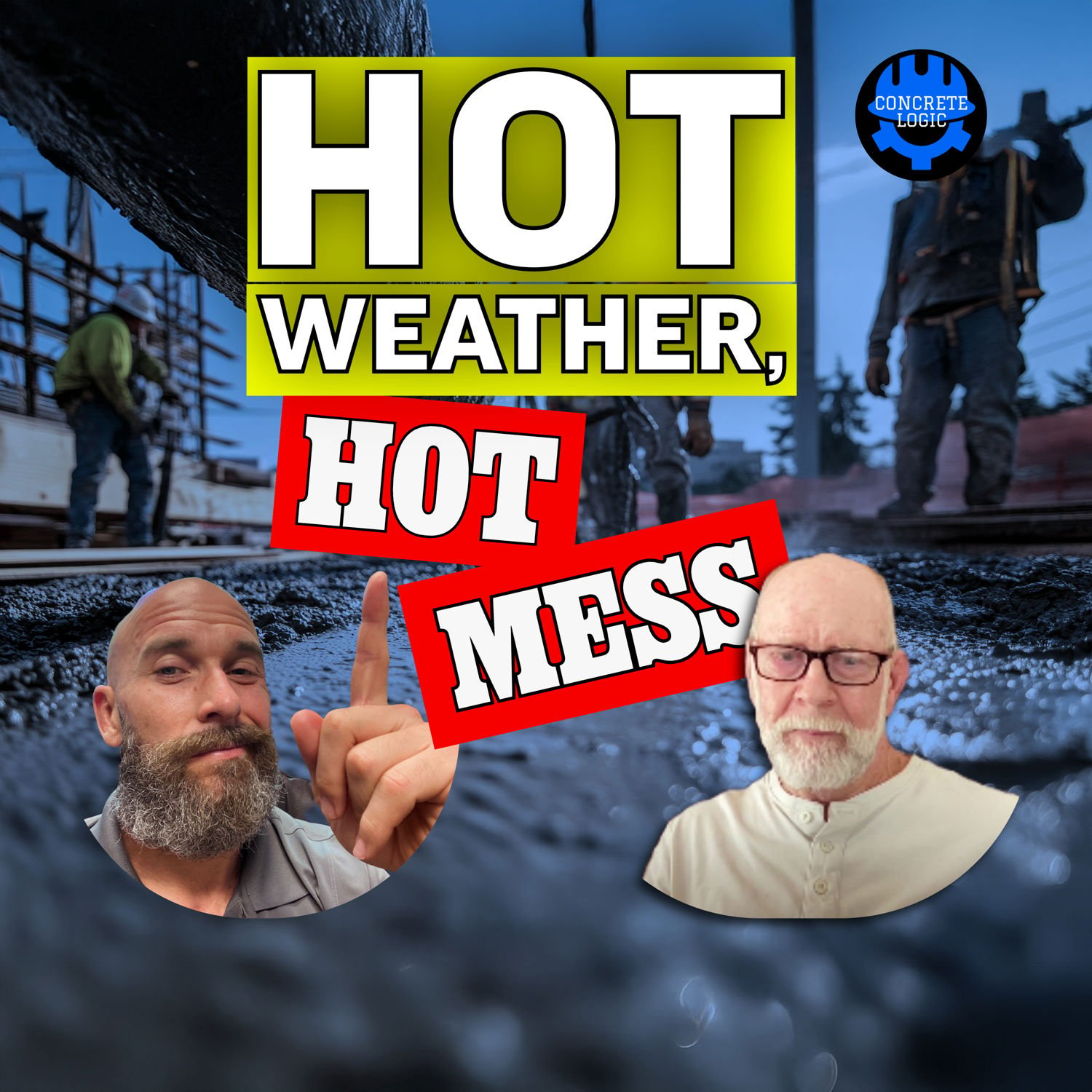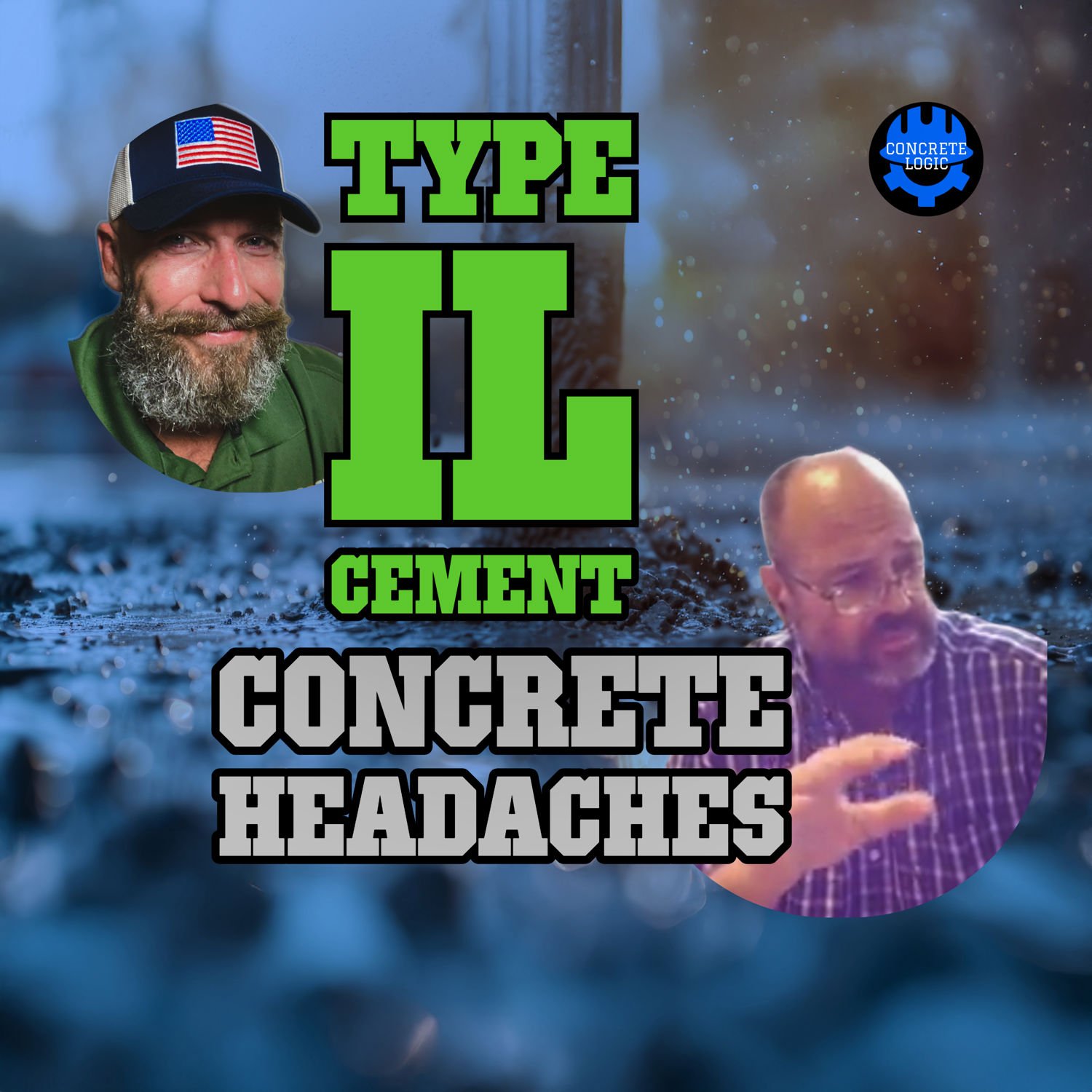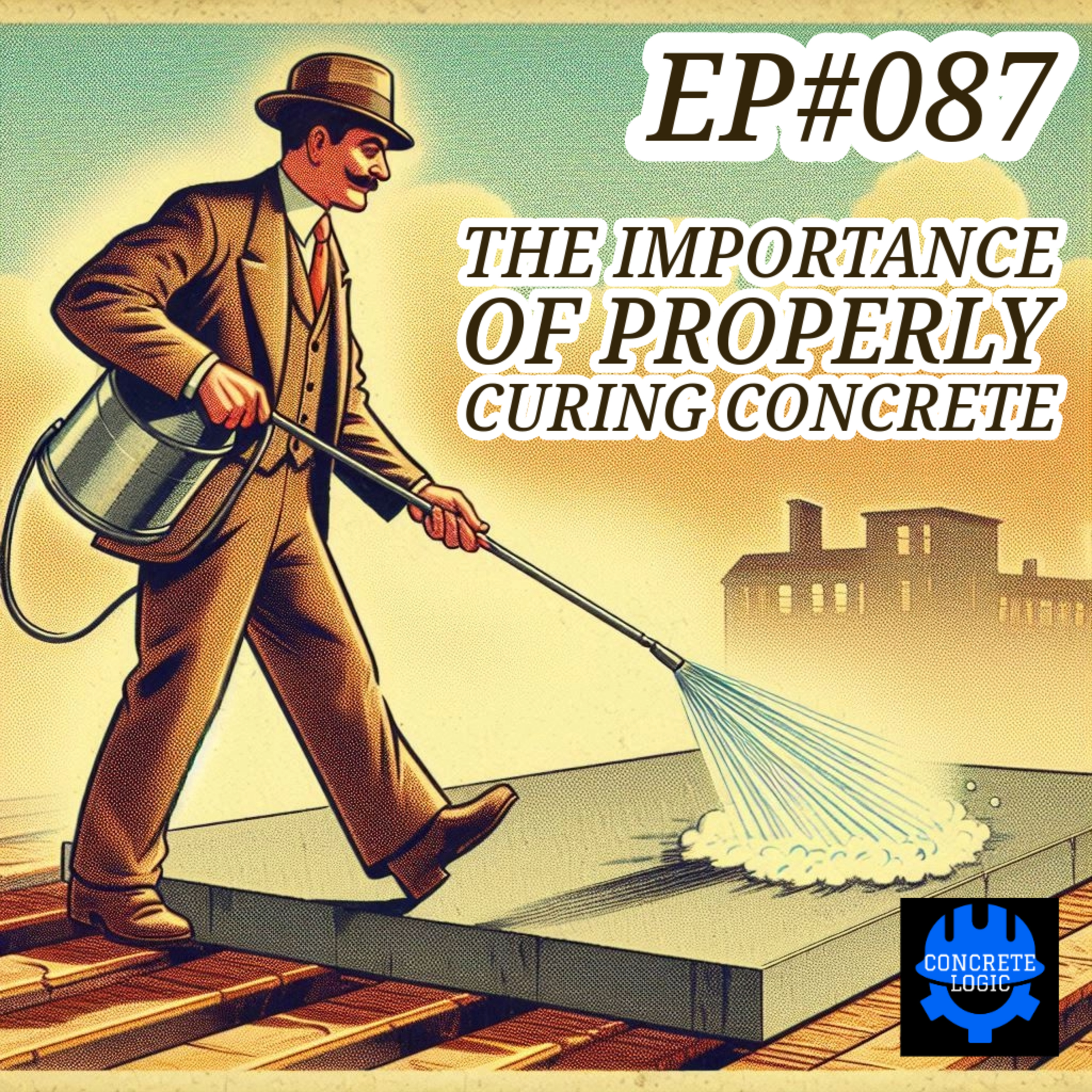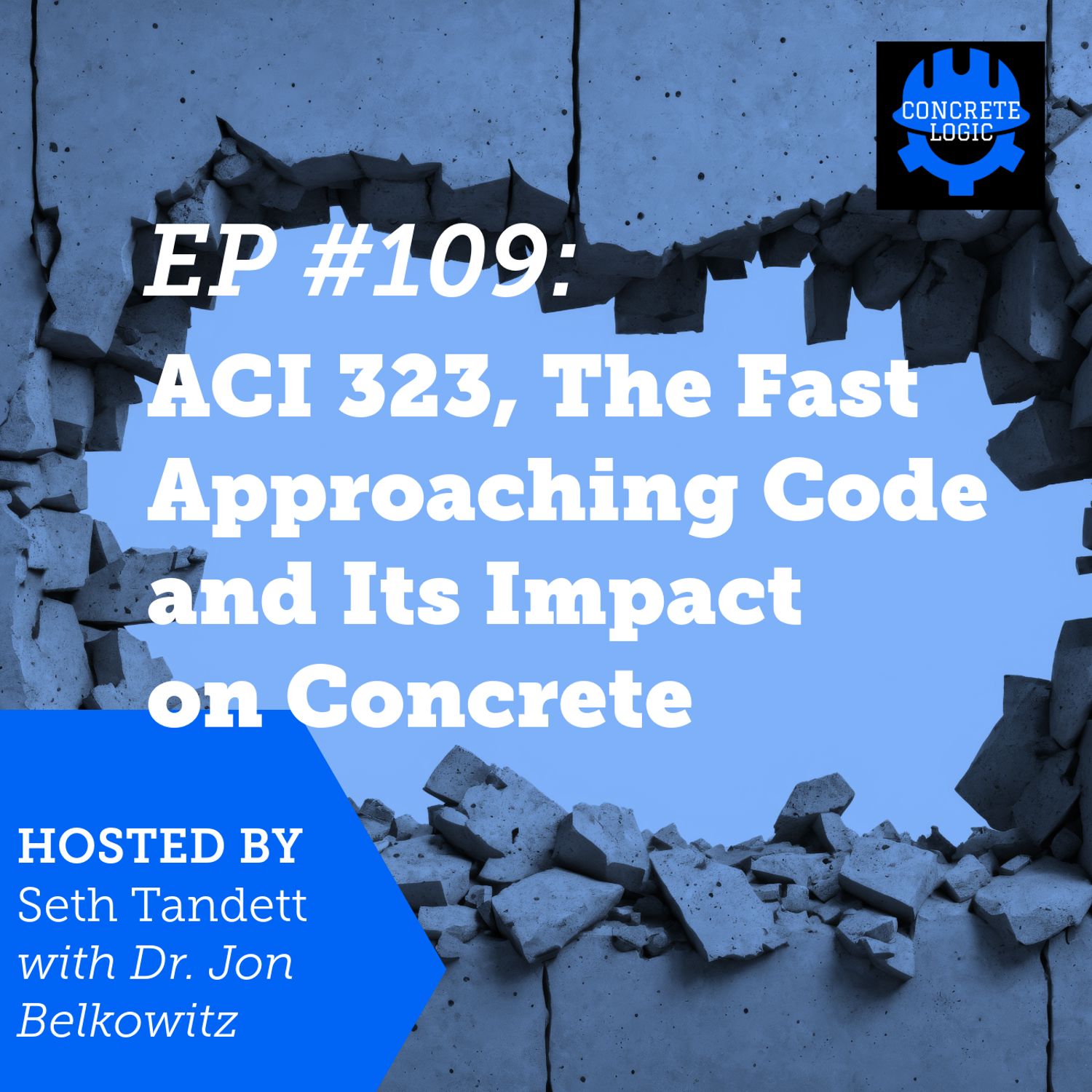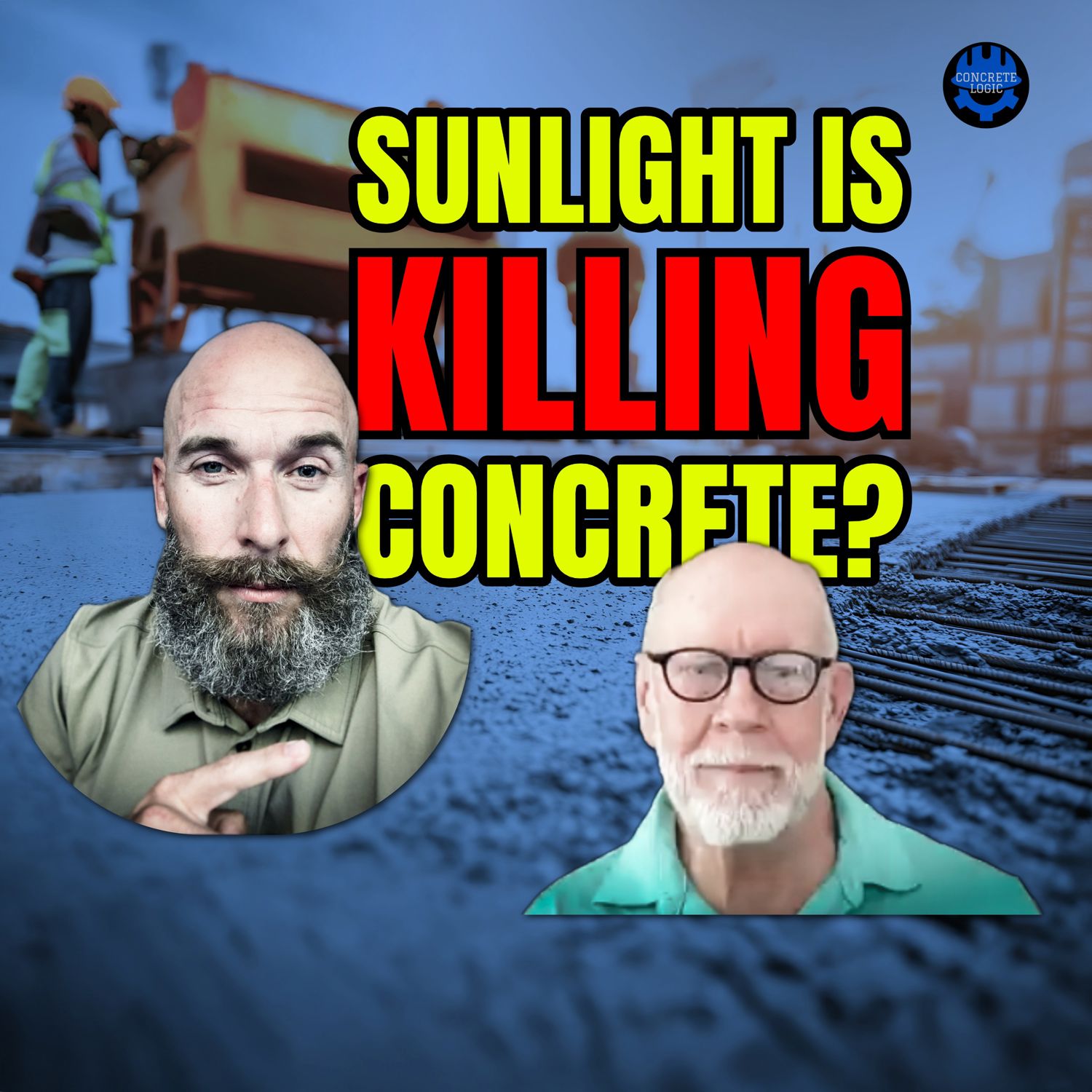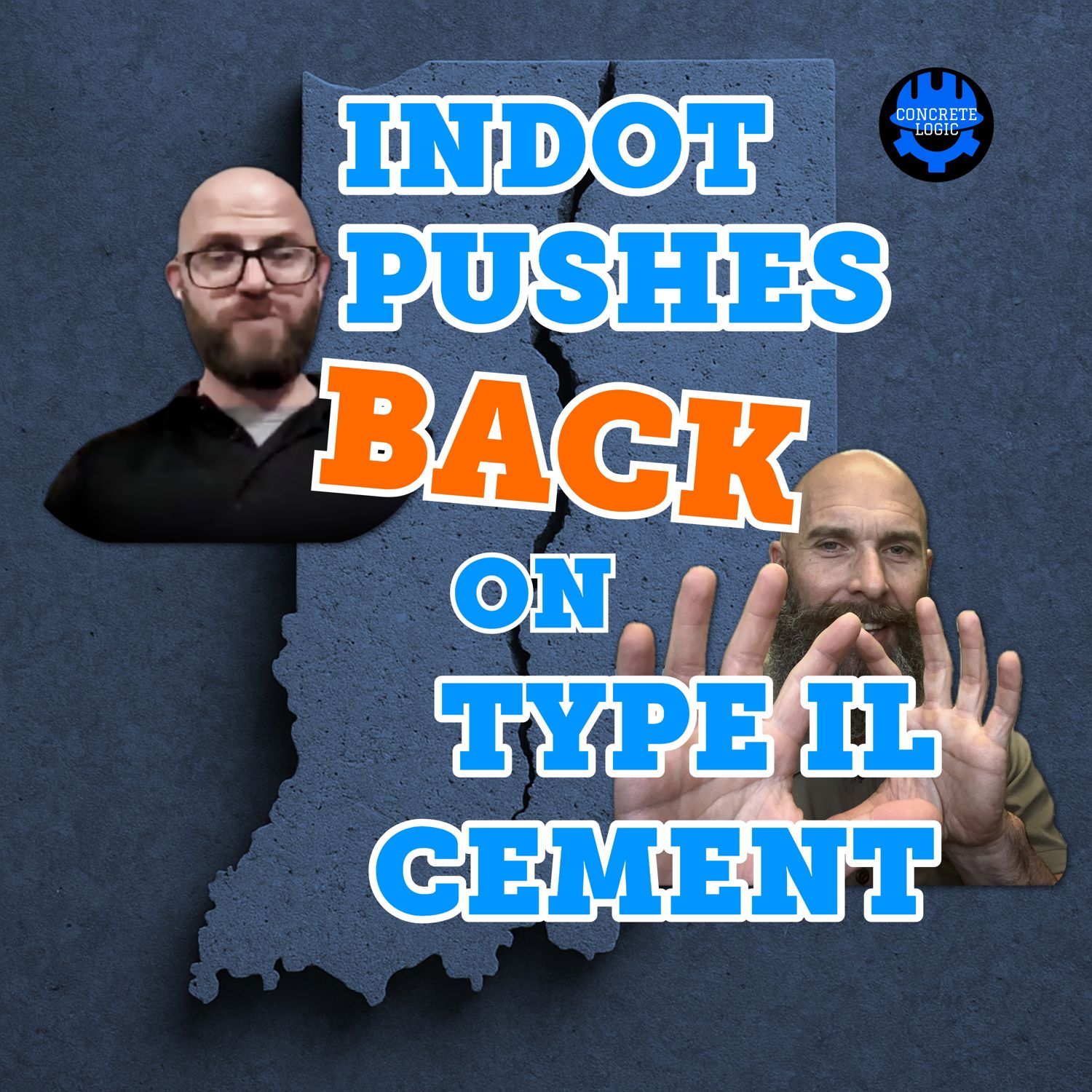EP #101: How to Start Your Journey as a Ready-Mix Concrete Driver
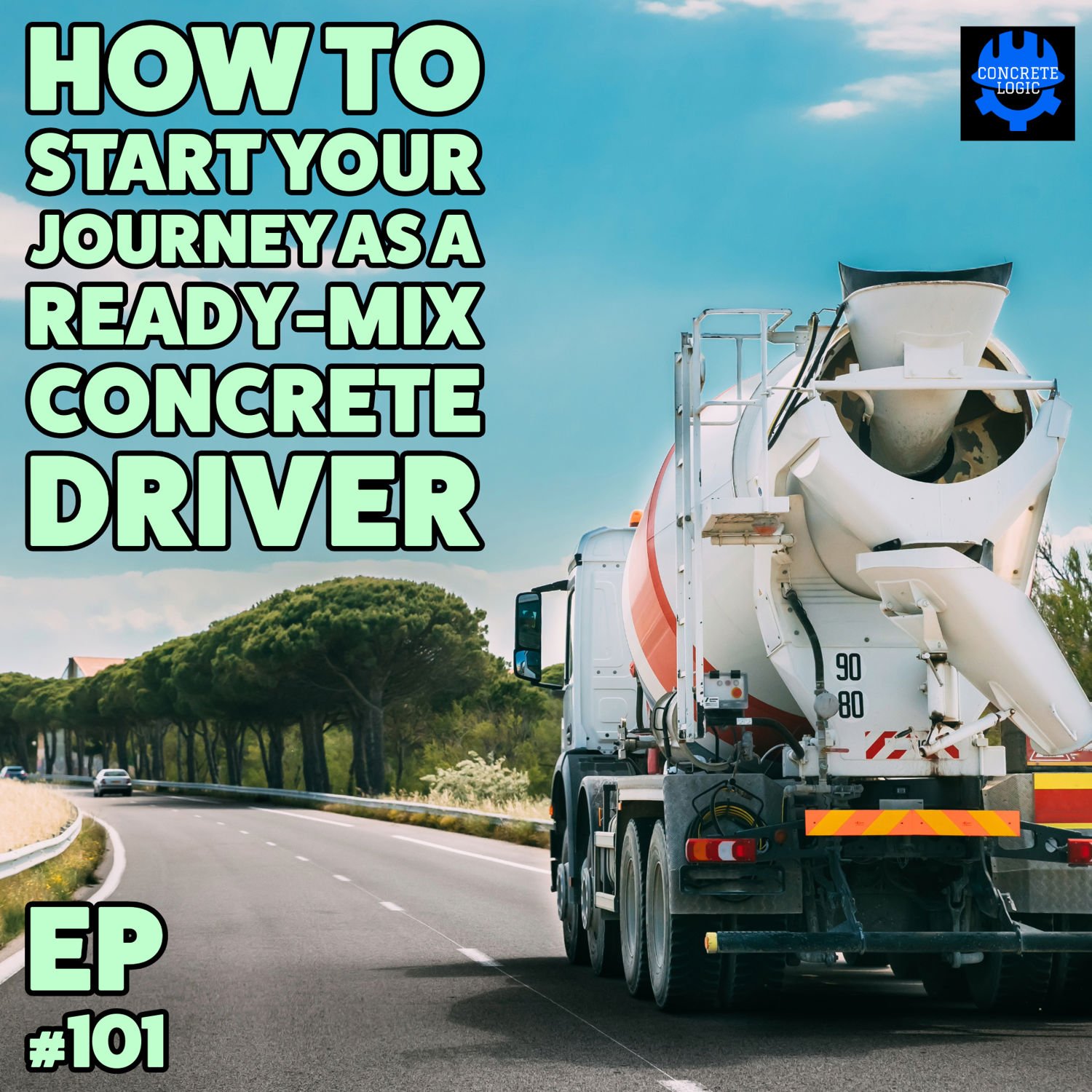
In this episode of the Concrete Logic Podcast, host Seth interviews Abigail Olson, a 24-year-old ready-mix driver and author. Abigail shares her journey into the concrete industry, discussing the challenges she faced in obtaining her commercial driver's license (CDL) and the unique aspects of her job. She describes a typical day as a ready-mix driver, the importance of teamwork on job sites, and the role's physical demands. The conversation also touches on the barriers for young drivers in the industry and concludes with Abigail discussing her memoir, 'The Hay Wagon.'
Takeaways
- Abigail always wanted to be a driver since high school.
- The federal age restriction for driving commercial vehicles is a barrier for young drivers.
- Abigail wrote an op-ed advocating for changes to age restrictions in driving jobs.
- Her job allows her to enjoy the outdoors and see sunrises. • The unpredictability of work hours is a unique aspect of her job.
- Abigail enjoys the active nature of her work, which keeps her moving.
- She listens to audiobooks and music while driving, making the time enjoyable.
- Training for her CDL involved extensive practical and theoretical learning.
- The job requires teamwork and communication on job sites.
- Abigail's memoir, 'The Hay Wagon,' explores her personal experiences and challenges.
Chapters
00:00 Introduction to Concrete Driving and Abigail's Journey
02:38 The Path to Becoming a Ready Mix Driver
12:47 A Day in the Life of a Ready Mix Driver
23:09 Challenges and Solutions in the Concrete Industry
30:46 The Importance of Experience and Training in Driving
34:48 Abigail's Book and Final Thoughts
***
Did you learn something from this episode? Would you like to support the concrete industry's favorite podcast? If so, donate at https://www.concretelogicpodcast.com/support/ .
When YOU donate to the show, you will be listed as a producer of the next episode that is released!
***
Episode References
Guest: Abigail Olson Guest
Website: https://abigailaliceolson.com/
Producers: Jodi Tandett
Donate & Become a Producer: https://www.concretelogicpodcast.com/support/
Music: Mike Dunton | https://www.mikeduntonmusic.com | mikeduntonmusic@gmail.com | Instagram @Mike_Dunton
Host: Seth Tandett, seth@concretelogicpodcast.com
Host LinkedIn: https://www.linkedin.com/in/seth-tandett/
Website: https://www.concretelogicpodcast.com/
LinkedIn: https://www.linkedin.com/company/concrete-logic-podcast
***
Elevate your concrete expertise and join a community of passionate professionals dedicated to driving industry innovation at the Concrete Logic Academy!
Learn more at https://www.concretelogicacademy.com/
***
Seth (00:01.248)
Welcome to another episode of the Concrete Logic Podcast. And today I have Abigail Olson and she is a ready mix driver. first one we've had on the podcast. So that's exciting. She's also an author. She happens to be 24 years old. You're still 24. All right. So we're going to talk to her today. She's going to share a little bit about why she chose to be a ready mix truck driver.
Abigail Olson (00:21.351)
Yeah.
Seth (00:30.524)
and also, share, share a little insight on what it is like day to day. Cause all we see, at least for me as a concrete contractor, they pull up on site and I'm yelling at them why, why they didn't get here earlier. So that's, that's my, my, my only insight on what a ready mix driver goes through. But so Abigail is going to help with that today too as well. But before we get started, as I always do.
just remind you on how you can support the podcast, and, and the reason why I asked you to do this is because we don't have any advertisers. We don't have any sponsorship. So it's, this podcast is up to you to support. there's three things you can do. One is you go to our, please share the podcast. after you listen to this episode today, please share it with a colleague or a coworker. the second thing you can do is if you go to concrete logic podcast .com.
There are two ways you can get ahold of me. There's a contact button in the upper part of the page. So it says contact, click on that. And when you do that, that's like sending me an email. And then the other way you can get ahold of me is there's a little microphone symbol or whatever on the bottom right hand corner of the homepage. Click on that. That's like sending me a voicemail. And when I'm looking for error topic or guest suggestions. So like today, Abigail.
Her uncle reached out to me and said, you need to have her on the podcast. So that's, that's what I'm looking for. I'm looking for topic or guest suggestions. And the third way you can support the show is on the concrete logic podcast homepage. There's a donate button. So if you get some value out of that, whatever dollar amount you think we brought to you today, or any of the hundred episodes plus, if any of those provide you any value.
please feel free to go to the homepage, click the donate button. You can give any amount. All right, Abigail. I'm actually 30 seconds quicker than I usually am. So we got an extra 30 seconds today. All right. So Abigail, you are a concrete ready mix truck driver. Why? Why'd you do that?
Abigail Olson (02:38.785)
perfect.
Abigail Olson (02:51.668)
Yeah.
Abigail Olson (02:55.573)
So when I was in high school, I really wanted to be a driver. And I knew that's what I wanted to do as soon as I got out of high school. But I actually had envisioned over the road driving. so when I got out of high school, I got my CDL and I started applying for jobs. And then I realized that a lot like, well, there's the federal regulation of
you can't cross state lines until you're 21 in a commercial vehicle. And so I was like, okay, well, I'll just look for local jobs. And a lot of them only had, or because of insurance, they wouldn't insure till at least 21, sometimes 23, like the current company I work for, hires at minimum age of 23. So it ended up being lucky for me. I applied like,
that the day after I turned 23, I turned 23 on not this past January, but the January before, January 13th, and I started working on January 31st. And so that was kind of timing. there was anyway, but applying for jobs was very difficult when I was 18. And I know you want to talk about this, but I wrote
like a little op -ed in the Richmond paper about like, well, actually a different trade organization had reached out and said like, yeah, if you want to write this article in the Richmond Times Dispatch, that would be very good because we're trying to lobby for those rules to be changed. And so I wrote that article and Tim Cain reached out to me or whatever about it. And then that trade organization, because
like they would talk about it in their meetings and then people would be like, yeah, we read that article or whatever. And so they invited me up to their conference in DC when they were lobbying. And I, you know, I spoke at their conference a little bit and then they took me around to like meet some of the Congress people to talk about, you know, how it would benefit to have a lower that age restriction. Yeah.
Seth (05:16.222)
Yeah. And it hasn't changed, right? It's still the same. Yeah.
Abigail Olson (05:22.101)
Not that I know of. I'm not really following because I'm over that age, but I think, I don't know. Now I have mixed feelings. I'm like, I am a lot better driver than I was at 18. But like, sometimes like I do know people who college isn't for them. And I really want to be able to say, I love driving like I love my driving job. Like, I really think you should consider it. And then I'm like, they'd have to wait years to do that. So
Seth (05:52.084)
Yeah.
Abigail Olson (05:52.639)
But then for specifically concrete driver, I actually didn't even know what it was until I started driving it. I was just applying for driving jobs. And I, I, at that point I was like, okay, I don't want to go over the road. That sounds like a terrible life. And, and I was like, and all my friends had like nine to five Monday through Friday jobs. So was like, I want something that I can like plan on weekends with them or whatever. And so I was like, okay.
I'm going to look for something Monday through Friday and during the day. And besides like dump truck driving, which I felt like there were a lot of like you needed experience for that. This was like kind of the only job that would hire. That was Monday through Friday and local, like no overnight. And yeah, it no experience. So yeah.
Seth (06:50.154)
Huh. Can we go back to when you got your CDL, which is commercial driver's license, right? How long does that take and what does it take to do that?
Abigail Olson (06:56.873)
Yes.
Abigail Olson (07:02.913)
yeah, so I, took me two months. started mid June and then I got it. I took the test and passed on like mid August, after high school. And, basically we had to do, we had to learn the part. So I got my class A, which, some people don't know like the class A is for like,
the tractor trailers and then the class B is just like straight vehicles like dump trucks, school buses, concrete mixers. But I went for my class A and one of the things that we have to do is the pre -trip inspection. So we have to like take, like undo that hood or whatever and be able to name a lot of the parts and like what they're supposed to look like. And then we go all the way down the truck and name
different parts and that they're working well. And then we go in the cab and we have to have certain things. And there was also like a brake test that we had to do, but basically just all of that, that I just had no knowledge of before. And then it was the, it was the pre -trip inspection. we had to get a driver's, I remember when they first asked me, they were like,
the school, they were like, do you have your learner's permit yet? And I was like, I have my driver's license. And they were like, no, your CDL learner's permit. I was like, no, I didn't even know I'd get that. And they're like, so you had to go take three tests at the DMV. And I just like read the DMV manual for that. And I can't remember what the three are. I know the one that took me three times to pass was the air brakes.
I just could not figure that out. But there were two other written tests that I don't remember what they were. So there was that to get the learner's permit. And then that's when they could take us on the road and practice driving around corners and stuff. Because on the test, if you hit a curb, you automatically fail. And we had some guys come back there. I hit a curb. We got to do it again. then there was also a
Seth (09:09.961)
Yeah
Abigail Olson (09:21.221)
like a backing portion, which is what we spent most of our time doing. And it was first you have to do like just straight back and then they're like cones down a lane and you just go straight back. And then they actually had like two lanes of cones. And so you have to, I can't remember if you start in one, but you basically have to like go back like this. And so.
That was surprisingly difficult figuring out just the right way to turn that. And then the last part, which was the most intimidating and the most difficult, was parallel parking the vehicle. And they had a little spot set up, I guess. They said that was new because people at truck stops were nicking other cars or nicking other trucks. And so they wanted people to know how to do that. So that's where I spent most of my days.
Seth (10:16.654)
Yeah. Do you remember how much time you spent, practicing or, you know, practicing or getting driving time, I guess, before you got your CDL?
Abigail Olson (10:27.477)
Driving time like on the road, I... It wasn't.
It wasn't a whole lot, but it was a very tricky section. We basically went around the block. Not like it was like a big block, there were like sharp, there was like this one turn. Well, there was a train track. So we had to like practice like slowing down, rolling the windows down, like looking both ways and like not shifting gears on it. But then there was also like, you know, when you're turning,
right sometimes and there's like a concrete triangle and there's like one lane. Was it one lane? I feel like it was something like that. It was very difficult to like not hit the curb when you were going through there. So even though it was short, it was enough practice. It was like busy enough and enough like tight turns and stuff.
Seth (11:17.301)
Yeah.
Abigail Olson (11:28.629)
I don't remember. I don't think it was a whole lot because I had to get my learners permit first. Maybe like.
Seth (11:34.965)
Yeah.
Abigail Olson (11:38.741)
And 20 hours. Yeah.
Seth (11:41.696)
Okay.
Well, that all sounds, like a lot of work in it, a little intimidating to me. I mean, when I was a kid, when I was getting my normal driver's license, I filled, I filled my first time. So I applaud you for, for doing that. I mean, yeah, it's just, yeah. When, when your uncle sent over there, I was like, wow, that's, it's just amazing. so, so you just, the.
the challenge of, not being able to drive over federal state lines. And that kind of led you to being the concrete driver. And you've been doing that for how long now? Year, year, year and a half. And I assume you're, you're liking it so far.
Abigail Olson (12:21.075)
Yeah.
Abigail Olson (12:28.669)
A year and a half. Yeah.
Abigail Olson (12:36.189)
Yeah, I love it. Yeah.
Seth (12:38.25)
Yeah. So what is, what, what do you like so much about, can you share like what your day to day typically looks like?
Abigail Olson (12:47.377)
Yeah, sure. I, I think the hardest part to get used to was we don't have like a set come in at a certain time schedule. So, basically we get a text the afternoon before of what time to be at work the next day. And so what I do, cause I like my eight hours is I was like, okay, I have to be in at this time and then I'm going to wake up an hour and a half over that. So I'm going to fall asleep.
eight hours before that. So I get to work the earliest I've ever had to be in is like 2 30 in the morning, but that is the earliest like that's only having blinds. There have been a like a good number of like being at three in the morning. But there have also been like a good number of like being at like six or seven. But if I do get a seven o 'clock, I'm like, good, I get to sleep in. And
So anyway, it's like kind of a wide range of times, but I would say usually it's like between 530 and seven, but not unusual to go a lot earlier. And so then we just get in, we do our pre -trip and then we, we back under the hole, which is like basically like a conveyor belt that puts all the ingredients in on a conveyor belt that puts it in the big hopper at the top.
and we have it going really fast and we fill up our water tank, get our ticket, look at the direction, see where we're going. A lot of times, we know where we're going because we've been there a lot. then one of the things, because he said what I like about it, one of the things that I really like in the mornings is I feel like almost every single morning I get to the sunrise and
I really like that. And I also really like, like the being outside and the fresh air, like when I show up, especially when there's like a crisp in the air and I see all the trucks like turning and like the lights, like it just makes me feel really alive. And I'm like, yeah, let's go like to the concrete. But, so, but that depends. Like if we're in at three in the morning, it'll be a while.
Seth (14:58.51)
Mm.
Abigail Olson (15:10.473)
Then we just pull forward and somebody else backs into the hole. And when we pull forward, there's another hose where we kind of wash down the truck and then put in water into the load to kind of get the slump right. Because on our ticket, it says the slump that the customer ordered. And then we're off to the job. And then there's some.
And that's like another thing that I like about the job is that like, I've gotten to know people so, but I never know when I'm going to see them. So it kind of feels like I'm seeing friends and like, hi. And, and then I also like, cause then when we get out to the job, you know, we do whatever they want. mean, like you said, getting mad at us for being late. I don't know if we're late. I only know for late. Cause sometimes they'll be like, are you busy today? And I'm like,
Seth (15:50.666)
Hehehe.
Abigail Olson (16:05.225)
I don't know, like we can't see the dispatch screen. So I don't know what time, how much we have going on. And I'm like, are we we late? Like what time were we supposed to be here? And they're like, you're supposed to be here three hours ago. And I was like, okay. Well, I'm sorry. And they're like, it's okay. You know, it always is always like that. And then like, I figure out what they need. And then I do that. and.
Seth (16:19.52)
Yeah.
Abigail Olson (16:34.377)
That's kind of fun to like, it feels like teamwork a little bit to like work together. or sometimes can be frustrating, but can also be really awesome. and then, yeah. And then we, washed down our trucks at the end of every load. We like washed down the suits and the blades inside. And that's something else that I really like about my job is that,
Seth (16:39.641)
Yeah
Abigail Olson (17:02.951)
I like that we're not just like sitting all the time. I don't know if this is true, but I did hear that it's like healthier to like get up at least like every hour. And I feel like this job is like exactly that. Like I feel like I'm almost never sitting for more than an hour. like when I get out, I'll get out and climb the ladder, put water in the load.
it's like active enough that I don't feel like I'm just like rotting. But then we also see people doing really, really hard work with the concrete. And I'm like, okay, well, I'm not killing myself or breaking my back. Like I'm just cleaning up every hour. Which is what I've heard is to help. So I do like that. Yeah.
Seth (17:46.624)
Yeah.
Seth (17:53.024)
Yeah. How many, how many, is your typical travel time from where you are? I assume I knew we were both in Richmond. So I kind of know this already, but I'll ask, but, is it like 20, 25 minutes? Is that usually your longest drive?
Abigail Olson (18:03.903)
Yeah.
Abigail Olson (18:10.641)
The longest ride I've done with a load is an hour, but I think that was I've only done that a couple of times because I was pushing it, I think because of concrete hardens on the truck and. Yeah, I would say typically it's like.
Seth (18:17.309)
-huh.
Seth (18:28.476)
Okay. And then so you deliver a load and then you turn around and go right back, right? Go back and.
Abigail Olson (18:34.357)
Yeah, right back to the plant or the company I work for has several plants like throughout like central Virginia. And so sometimes they'll send a message on the tablet like, go to the Dozzled plan or the Bottoms Ridge plan or something like that. And then, you know, we'll go there and get a load there and then go 20 to 30 minutes away from that. Yeah.
Seth (18:58.554)
okay. Cool. So they have a little tablet that you kind of, they tell you what your next mission is, I guess. Yeah.
Abigail Olson (19:05.425)
Yeah, yeah, basically. then, but the default is to go back to the same plan. but
Seth (19:14.932)
How many loads do you think you deliver typically on a day? How many?
Abigail Olson (19:20.757)
I would say on a slow day it's like three or four and then on a much busier day it'd be like five to seven. So four to six is a difficult thing.
Seth (19:36.818)
Yeah. It goes by fast.
Abigail Olson (19:39.325)
It goes by really quickly. Yeah. And then that's like, well, the driving part is another thing that I about my job is because sometimes I say it just feels like endless media consumption because I just get to listen to like, audio books or music. And one time I was listening to the radio and, you know, like somebody it announced like, you know, this artist just dropped their new album. And I was like, really? And then I just like went to that album and I just like
press play it I was like, I love that I get to do this and, and a podcast. Yeah. Exactly. Yeah.
Seth (20:11.296)
And a podcast, right? Listen to this.
Seth (20:20.282)
That's cool. So the training that you get so far, I'm sure you're constantly getting some kind of training. they teaching you like when to spin the drum or how to spin the drum?
Abigail Olson (20:31.893)
Mm
Abigail Olson (20:42.765)
yeah. So there's, there's like this little like lever thing that controls like if you're discharging or keeping it in the drum and it actually also controls the speed at which it's doing that. And so, and then there's another thing where it like turns up the drum. And so if you have it all the way forward, the lever all the way forward, and then you turn up the drum.
It goes like really, really, really fast. You can't drive it that way. That's when we're getting loaded or adding water. and then as soon as you hit the brake, it like goes back to the normal fast speed. and they talked a lot about like when, we're going, so like when I'm cleaning, I also have it like the, at the fastest, but when I'm driving, you want it at kind of like a slower steady speed, but you don't want it so slow that.
it could come out the back if you're going up a hill. So that took a while to get used to, adjust the speed and when you're driving. then, I remember when I first started, like, you know, you start on the 25 mile an hour road, going at the plant and you have your speed. But then when you get on the highway, the drum actually spins faster when you start going faster. So then you like slow it down, but then you have to watch it still because
you, when you get off the highway, then it's going way too slow. And sometimes, like I heard that sometimes it can happen where if you're not paying attention and you don't speed it up, like, it'll start coming out the back. And so that's another thing that we have our chute pointed to the right so that if something does happen and concrete comes out the back, it'll go on the side of the road and it won't like mess up the roads too much. But
But yeah, then you have to speed it back up when you get off the highway. And so like, I'm always like, looking out like, at the driver's side mirror to check on my speed. Yeah. And then sometimes when it's been a long day, I'll like be in my car and I'll look out and like, wait, what am I looking for again? yeah, I'm not in a mixer. Yeah.
Seth (22:58.496)
Yeah, yeah, you're not in the truck.
Abigail Olson (23:04.659)
Yeah.
Seth (23:06.729)
you
So that challenge, we talked about it a little bit earlier about getting younger folks to drive concrete trucks. When you were up there or since you started driving the concrete truck, have you thought of ways that we could kind of fix that problem? I know you said.
You're a way better driver than when you started, obviously. that, that goes for, to me, that goes with any career. mean, no matter what you do, you get better as you get experience. So, but it's definitely, want to encourage folks to, you know, pursue, and then like yourself wanted to drive a truck. So how do we, how do we fix that problem by giving folks that,
opportunity but same time obviously keep the I guess they they think at that age you're you're you you've driven enough that you have the experience and you're a safe driver by that point or and I imagine the insurance cost to cover an 18 year old driving in a ready -mix truck or
a long distance truck or whatever, it's probably pretty expensive. But have you, have you thought of that and what, what we could do to fix that?
Abigail Olson (24:41.685)
I have not thought about it actually.
Seth (24:50.398)
Like when someone first starts with you guys, like on the concrete, do you, do they don't just go, Hey, jump in that truck and start driving. Do you ride along for. Yeah.
Abigail Olson (24:50.729)
I think.
Abigail Olson (25:00.187)
Yeah, yeah. So my my trainer when I first started, like he had me drive like a very short distance. And then he was like, okay, you did good. So, you know, do a longer distance, but it still wasn't too long. And we do when we train. And that's what I did when I was training somebody as I started.
at shorter distances too. And so they do have like, when we're training or when we're being trained, they, you start driving empty first, and then you start driving with more yards on the truck. And then eventually you get up to being able to do like a full load. So they do like work you up that way.
And I know when I was younger, like when I was 18 and like you weren't hiring me, was like, there should be like a test where like, if you like some driving tests where it's like, okay, if I pass it, then it shows that I have the driving abilities that they want. but I, I haven't really thought more about that because I felt like, well, you know, passing the CDL test isn't enough to prove that I can drive it safely. They should have more.
like tests or make it longer or something to prove that I can drive it safely. I don't know. Yeah, I don't know. But yeah, we did work slowly in the mix to get up to it. Yeah.
Seth (26:40.82)
Yeah.
Yeah, no, I, I, I kind of understand both sides and, know, you definitely want to have driving experience, but at the same time there's, there's 30 year old people that probably should drive those trucks. You know what I mean? 18 or 30, you probably shouldn't drive those things. Cause you, know for me, for one, I shouldn't jump in one of those things and start driving them. Cause I, you know, I haven't had any training or anything. So I think if you're getting that same amount of training and you should get that same, that same opportunity. So.
Abigail Olson (26:47.977)
Mm
Abigail Olson (26:55.285)
Yeah.
Abigail Olson (27:13.567)
Mm -hmm.
Seth (27:14.4)
Maybe they just need to, like when you go get your driver's license, like at 16 and there's kids that are interested in doing that. Maybe you start training them then, right. Get them in there. Cause I know like, around here and around Richmond, and I'm sure it's like this across the country is, there's, there's high schools that'll throw you in a piece of a heavy, heavy equipment if you want to and learn how to do it when you're still in high school.
Abigail Olson (27:25.525)
Mm -hmm. Yeah.
Seth (27:44.192)
so, yeah. So, you know, I would think you could, you know, start doing it the same way. I'm not saying we need a bunch of, you know, 16, 17 year olds out there driving, driving big, big rigs or anything, but I'm saying you could start that training then. So by the time they graduate from high school, say, Hey, I did this training. You know, I can,
Abigail Olson (27:51.797)
Mm -hmm.
Yeah.
Abigail Olson (28:07.967)
Mm -hmm.
Seth (28:12.344)
I'm ahead of my peers in this aspect. like kids can take college credits in high school, think you should be able to do the same thing. And I'm sure there's somebody out there doing this. If it's obvious to me, it's not an original idea. I promise you. Somebody out there has figured it out.
Abigail Olson (28:24.703)
Mm
Bye.
Yeah, well, I have like now that I've started, you know, I've met some people and they're like, one, there was one pump truck driver who he was like, yeah, I've been doing this for 10 years. And I was like, how old are you? Like, you look kind of young. He's like, I'm 25. was like, how have you been doing this for 10 years? You're like 15? Like, was that legal? He was like, well they like.
Seth (28:54.9)
Yeah.
Abigail Olson (29:01.237)
I like, you know, they were just, they just like set me up and I learned how to do the controls. And then I learned how to set up or something like he was learning. then once he got, then when he turned 18, he knew everything else. And then he was able to drive the truck. And so I have heard stories like that where they, and then I think there's another truck driver when he started at 18.
I don't know, maybe that's the way to get it when you're 18 is the pump drugs. But, and then there was somebody else who I met who was like, yeah, you know, I've been driving, you know, I was a mover for a couple of years or whatever. And I was like, you look really young. How old are you? And he was like, you know, yeah, I am really young. And I was like, were you allowed to be doing that? he was like, mm -mm. So, yeah. So I don't know how much. Yeah.
Seth (29:33.952)
Hehehehe
Seth (29:55.008)
Yeah.
Abigail Olson (29:59.967)
people. But there's just be a way people can just go ahead and do it. Yeah.
Seth (30:03.87)
Yeah. Yeah. And the farms in Virginia, mean, there's all kinds, you know, kids are out there helping where they can. So sometimes you're driving or operating machinery that you wouldn't be allowed to off the farm to help out. that's, that's, that might be one of them too. Well, cool. Well,
Abigail Olson (30:12.639)
Mm -hmm.
Abigail Olson (30:18.696)
Mm -hmm.
Abigail Olson (30:23.859)
Yeah. And I've also learned that like the most important part is like paying attention. Like if you pay attention when you're driving, that's important. Yeah. So I don't know how that would maybe, yeah, it just comes with experience too. Sorry, what were you saying?
Seth (30:34.837)
Yeah.
Definitely.
Seth (30:43.21)
Yeah.
Well, I was going to ask you, is there anything else we should know about being a concrete ready mix driver?
Abigail Olson (30:53.653)
Hmm.
Seth (30:54.976)
that we didn't hit on today that you want to share with the folks before we end the day. I told you 30 minutes goes by fast.
Abigail Olson (31:01.159)
It does go by quickly. I don't know. guess something that I didn't share that, well, I don't know how much y 'all know about it because y 'all are confident. But when I talk to people outside, like, or who don't know, we have, like, different kinds of jobs, like tailgating jobs versus, like, pump truck jobs. I don't know if y 'all know about.
Seth (31:27.551)
Mm -hmm.
Abigail Olson (31:31.571)
that but people usually are interested in what that is.
Seth (31:34.664)
Yeah. If you want to share about that, mean, I know, I, I know what you're, you're talking about, but I don't know your perspective. Like, again, I, I know what we see when you guys pull up and to us, it's. Truck showing up. It's got concrete in it. We got to get it either dumped, dumped into the hole or into the pump truck or the, know, what that's how we look at it. We're like, Hey, Hey, Hey guy.
Abigail Olson (31:49.691)
Abigail Olson (31:56.533)
Yeah.
Seth (32:00.49)
Take, get your test done, get your slump test done, get your air done so we can get it into the pump truck. So we can get it up on the, on the deck. That's, that's, that's our mentality. so what, what, what is it, what, what is it like for you if you were tailgating versus if you were putting in a pump, pump truck.
Abigail Olson (32:03.253)
Yeah.
Abigail Olson (32:12.711)
Okay.
Abigail Olson (32:20.041)
So like the pump trucks are the easiest. just, they tell you, okay, it's over there, back up like this. And you just back right up and then you stand and you just pour it in from the outside into the pump trucks hopper. But then like tailgating, you usually have to put on like extension shoots basically. And those can be heavy, but they have had like lighter ones now. But if you get them too light, they'll bend. So you still need some heavy ones.
And then what people who know nothing about concrete, they're very fascinated by how they're like hand signals that people outside the truck know and that we know to control the shoot, like moving it up and down and locking it and stuff and then controlling the speed. And those just tend to take a lot more effort and focus because they're usually like
Seth (33:01.565)
yes.
Abigail Olson (33:17.489)
obstacles and you're like, okay, now back your truck all the way this way around this turn around this thing and then we'll do it. Okay, now go around there and back it up there. So just is a lot more like, just ever in like going around things, but it's usually not too bad because people, everyone's helping you because nobody wants you to run. Yeah, yeah, exactly. They don't want any damage done.
Seth (33:40.202)
They want, they want what you got in the truck.
Seth (33:46.815)
Yeah.
Abigail Olson (33:47.421)
Usually we're all on the same page, but yeah, it can be fun. But there are like different types and sometimes we don't know what we're doing when we show up. So. It's a show, yeah.
Seth (33:50.942)
Yeah.
Seth (33:58.654)
Yeah. Well, I know you ha you've been doing it for a short time, but I can tell you're you're you're a concrete person. You love concrete. So that's, that's, that's great.
Abigail Olson (34:07.285)
Yeah, I really do. Yeah, it's fun.
Seth (34:12.607)
That's awesome. So hopefully my kids listen to this and they say, Hey, there's, there's even young younger people that think concrete's cool. See? Yeah.
Abigail Olson (34:20.745)
Yeah, one young person. Yeah.
Seth (34:25.408)
there's a lot of them out there. So yeah, no, I appreciate you coming on the show. I probably failed to say this earlier, but you wrote a book too. Can you tell us a little bit about the book and where people can find it? And if people want to reach out to you, I'm sure they will once they hear this.
Abigail Olson (34:48.18)
So basically the best way to reach out to me is through my website which is the whole thing is abigailaliceolson .com. Do you want to spell that out?
Seth (35:02.024)
No, no, no, I'll put it in the show notes. So when I released the podcast, I'll put a link in there for everybody to click on. It'll go right to your website.
Abigail Olson (35:07.549)
Okay. Yeah, so that's the best way to reach me. I don't I got rid of all my social media. Yeah, watched that. Thanks. Yeah, I watched that social dilemma on Netflix like three times. And then I was like, okay, like with each time I got rid of more of my social media. yeah, so I wrote a book.
Seth (35:13.345)
I like that idea. That's an awesome idea. I like, I like you more and more. The more you talk about what you're doing.
Seth (35:30.057)
Awesome.
Abigail Olson (35:34.485)
It was a long time ago. It was like four years ago. I was like 20 That was like something that I tried when I was like, okay, maybe you know this driving isn't for me I'm not having a lot of success at this age and it was a memoir and like short stories kind of more like vignette and Basically like what I when I talk about it the thing that gets people the most excited
hear it is when I say, well, basically, I wrote it when my boyfriend at the time broke up on me on the same day that I didn't want to be a truck driver anymore. And I took the next flight to Mexico. And down there, I like wrote this book. And so it's basically about all of that drama. And it ended up getting I went with like a small publisher in Richmond. So there was like, like a
big indie awards and it was a finalist for women's issues, nonfiction and short story collections. So yeah, that's what that was.
Seth (36:39.648)
That's awesome.
And I ordered a copy today, so my daughter's going to get it so she can read it. That's awesome.
Abigail Olson (36:45.269)
Okay. Well, I appreciate it. And it can be ordered. It's called the Hay Wagon and it can be ordered through any bookstore. They probably won't like have it, but you can order it through any or Amazon or Barnes & whatever.
Seth (37:01.184)
Cool. Well, great. Well, I appreciate you sharing today and I hope we stay in contact and follow your journey. yeah, I appreciate it. And folks, until next
Abigail Olson (37:16.885)
Thank you for having me on here. It was kind of fun to talk about concrete. I love talking about my job. Yeah.
Seth (37:22.024)
Yeah, no, if you like doing this, I'll bring you back on. You want to talk about some you have, you know, it's yeah, anytime. All right, folks, until next time, let's keep it concrete.

Mixer Driver / Author
Abigail went Maggie Walker and decided to pursue a commercial driving career over conventional college. She now delivers ready mix for a company located in Rockville as a 24-year-old young woman. Her memoir, The Hay-wagon, was a 2021 Next Generation Indie Awards finalist in the Short Story Collections and Women's Issues (Non-Fiction) categories. She also briefly lobbied congress to change federal interstate trucking laws.







